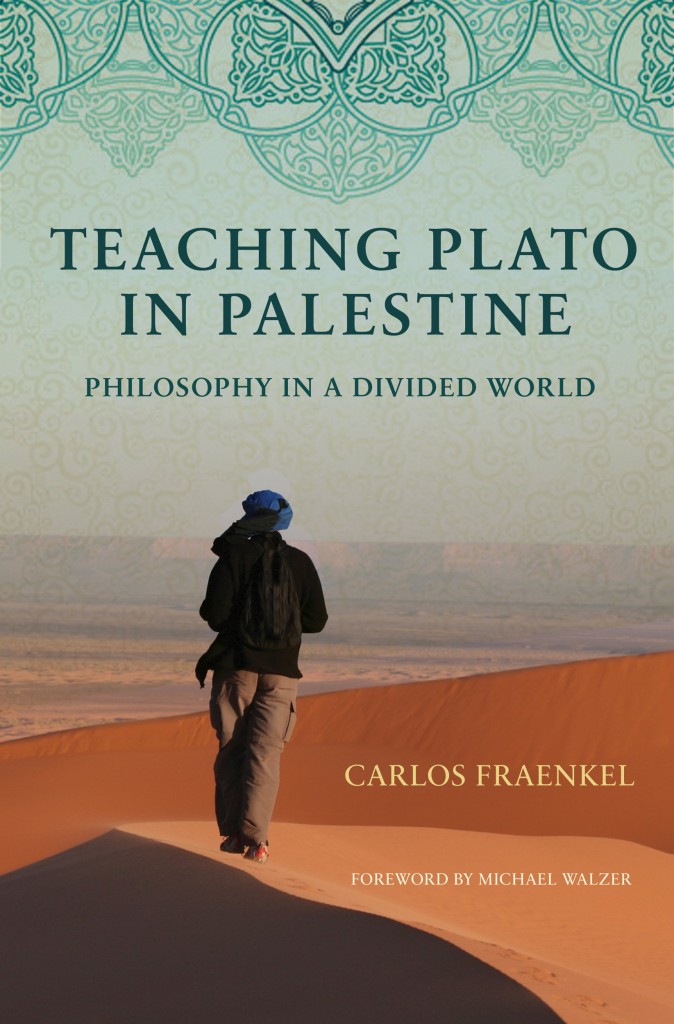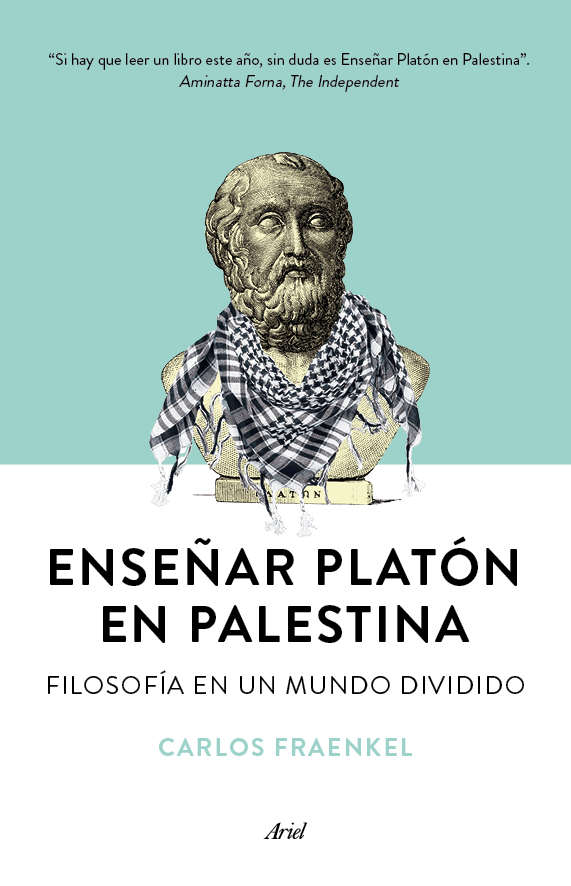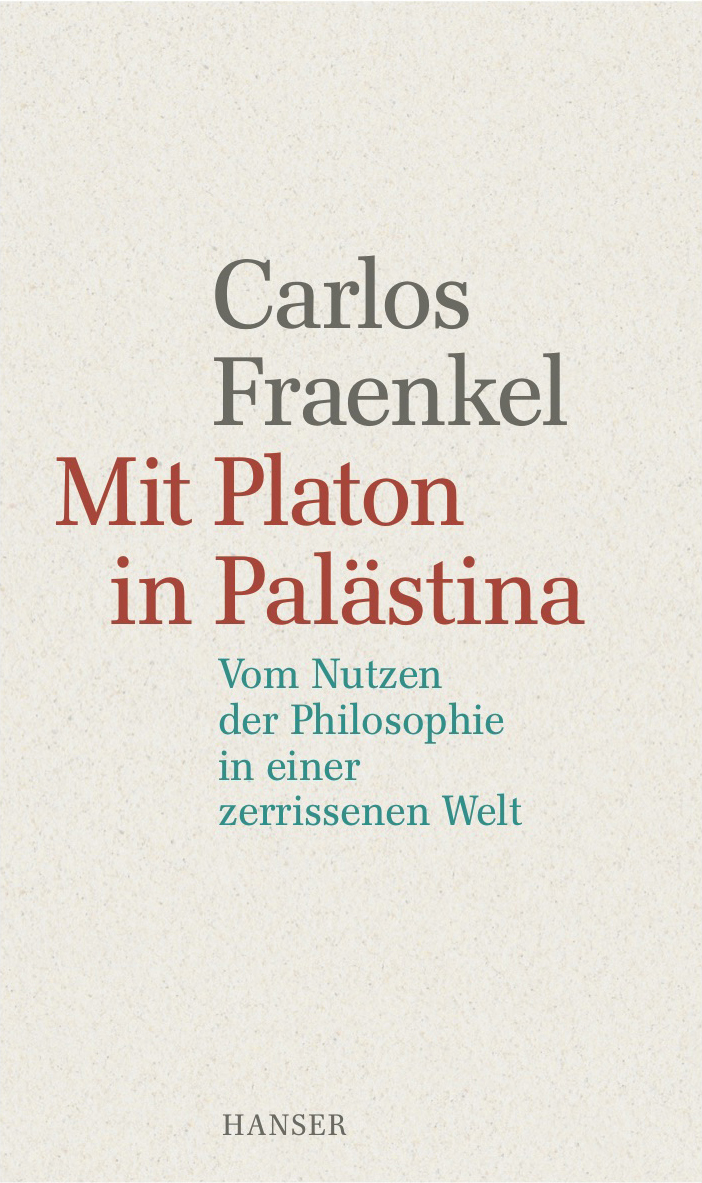Latest Book
Winner of the Mavis Gallant Prize for Non-Fiction 2015
Finalist for the Sheikh Zayed Book Award in Arabic Culture in Other Languages 2016
"If you read one book published this year, you might make it Teaching Plato in Palestine: Philosophy in a Divided World." Aminatta Forna, The Independent
"What unites [the classroom conversations] is [Fraenkel's] skill in the art of posing questions designed to perplex and provoke. He lets us overhear the Socratic form of dialogue that Plato invented and that Mr. Fraenkel practices much to his students’ pleasure, and ours." Benjamin Balint, The Wall Street Journal
"Fraenkel’s commitment to democratizing philosophy is both authentic and admirable. His book reminds us that philosophy is a practice of educating citizens, a dialogical quest for mutual understanding. It is a timely reminder that engaging others over disputed values and beliefs requires not only skill in argument but also an openness toward different views and a commitment to the shared pursuit of truth. This remarkable experiment in practicing Socratic dialogue in a divided world proves that we need philosophy now more than ever, especially when ideology and nihilism threaten to undermine any ethical culture of debate." Robert Sinnerbrink, Los Angeles Review of Books
"The book [...] shows us how to cope with each other in a world where we may share citizenship but at the same time be rooted in different cultures and hold different convictions, or where political borders may signal deep cultural or religious divides, often expressed in animosity and conflict. The 'culture of debate' approach to dealing with such differences or divides stands to be far more conducive to a flourishing coexistence than alternatives grounded in a single set of liberal values. [...] An honest engagement with the 'other' signals both respect for them as well as a readiness to be self-critical about one's beliefs: it is a positive engagement in civil life, rather than a de facto toleration for living under the same political roof with suspicious strangers." Sari Nusseibeh, Common Knowledge
"The author urges religious people who aren't bound by literalism, secularists who don't dismiss all religion as anachronism, and inquisitive types of all persuasions to try something. First, accept freedom of expression, recognize your fallibility and prepare yourself to revise received assumptions. And then plunge into debates about morality, faith, governance, rights and other matters that divide us [...] The discussions you engage in, as suggested by his and his students' experiences, will likely broaden your horizons and nourish your intellect." Rayyan Al-Shawaf, Toronto Star
"Carlos Fraenkel [...] persuasively shows the value of philosophical work that engages the broader public and other cultures. [...] Each [episode in the book] is beautifully described and the results are utterly captivating." Daniel A. Bell, Literary Review of Canada
"[L]ucid and compelling. Fraenkel makes an eloquent case for a culture of debate that requires strong convictions tempered by a sense of one's own fallibility." Frank Freeman, Hedgehog Review
"Fraenkel offers a bold answer to the question of what philosophy has to offer to the non-philosopher. Philosophy is important not because the corporate world needs sharper analysts; not because it exposes myths and emancipates slaves; not because it draws us closer to God. Rather, we, each and every one of us, should philosophise so that we might become more deeply enmeshed in our friends and neighbours' individual quests for truth. This is an inviting vision." Taneli Kukkonen, Philosophers' Magazine
"Fresh, iconoclastic, stimulating debates." Kirkus
"The engagingly anecdotal essays [...] gathered here describe [Fraenkel's] adventures as a kind of cultural ambassador for philosophy, as he arranges to teach or lead discussion groups among Palestinians, Indonesians, Brazilians, Mohawks living in Canada, and Hasidic Jews in the United States." Peter Adamson, Times Literary Supplement
Teaching Plato in Palestine is a slim, straightforward yet surprisingly rich work of philosophy that will intrigue the amateur as well as the expert. Sarah Gustafson, The Key Reporter of the Phi Beta Kappa Society
Teaching Plato in Palestine among "Books of the Year 2015" chosen by the Australian
"[E]in äußerst lesenswertes Buch." Uwe Justus Wenzel, Neue Zürcher Zeitung
"Dies ist ein wichtiges philosophisches Buch. […] Ein wenig verrückt muss wohl in der Tat sein, wer heute loszieht und mit Philosophie die Welt retten will. Aber einen Versuch ist es wert.“ Manuela Lenzen, Frankfurter Allgemeine Zeitung
"Carlos Fraenkel liefert ein beherztes Plädoyer für den Nutzen der Philosophie als Instrument der Verständigung über kulturelle und religiöse Differenzen hinweg." Catherine Newmark, Deutschlandradio Kultur
"Fraenkel liefert mit seinem Werk ein engagiertes [...] Plädoyer für geistige Offenheit und differenzierte Wahrheitssuche." Aurel Jörg, Kontext (SRF 2 Kultur)
"Dieses Buch liest man mit Begeisterung." Christian Modehn, Humanistischer Pressedienst
"La labor de Fraenkel--y su mayor logro--es propiciar un debate respetuoso en el seno de todas esas culturas. [...] Se trata de cuestionar los límites de la tradición para cultivar el pensamiento propio. Y eso también--o sobre todo--vale para el lector." Clara Morales, infoLibre
"Una buena idea, un mejor trabajo y, quizá, una solución." Juan Bolea, El Periódico de Aragón
"Las situaciones de exclusión, opresión y calamidad no son producto de la casualidad, sino de instancias, estructuras e individuos que requieren de la acriticidad de la mayoría para consolidarse. Es ingenuo pensar que por sí mismas, o por una especie de desarrollo social por “inercia” surgirán las condiciones para filosofar. Estas condiciones surgen, paulatinamente, con esfuerzos como el del profesor Carlos Fraenkel." Leonardo Díaz, Acento


